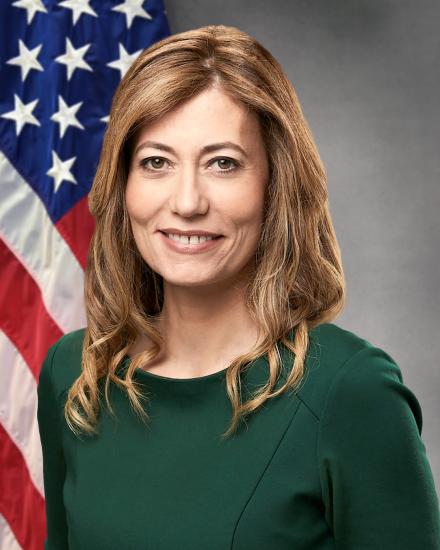Disrupt and Dismantle: The Fight Against Fentanyl, Poisoning of America with DEA Administrator Milgram
Episode #55 | 13 June 2023
Fentanyl is the single deadliest drug threat our nation has ever encountered. Just 2 milligrams of it, enough to fit on the tip of a pencil, can be lethal. From large metropolitan areas to rural America, no community is safe from this poison.
Across the U.S. we are seeing overdose deaths climb at an alarming rate, especially those caused by the synthetic opioid, fentanyl. According to the CDC, 107,375 people in the United States died of drug overdoses and drug poisonings in the 12-month period ending in January 2022. A staggering 67 percent of those deaths involved synthetic opioids like fentanyl.
On this episode of the Blue View Podcast, National President Patrick Yoes sits down with Administrator of the Drug Enforcement Administration (DEA), Anne Milgram. As head of the premier drug enforcement organization in the world, Milgram leads an agency of more than 10,000 public servants, including more than 4,000 Special Agents.
Prior to assuming her duties at the DEA, Milgram served as New Jersey’s Attorney General from 2007 to 2010. In that role, Milgram was New Jersey’s chief law enforcement officer, led the 9,000-person Department of Law & Public Safety, and had oversight responsibility for state and county prosecutors and more than 30,000 local law enforcement officers.
“No one is immune, no community is immune, no state is immune. And we see this suburban, rural, urban. We see it with all the police departments we work with… I think that this is the greatest national security threat to our country today.”
— Anne Milgram, DEA Administrator

About Anne Milgram
Anne Milgram was sworn in as DEA Administrator on June 28, 2021, after being confirmed by the United States Senate by unanimous consent on June 24, 2021. As Administrator, she leads an agency of more than 10,000 public servants—including more than 4,000 Special Agents and nearly 900 Intelligence Analysts—who work in 241 offices across the United States and 93 foreign offices across the globe.
Prior to assuming her duties at the DEA, Milgram served as New Jersey’s Attorney General from 2007 to 2010. In that role, Milgram was New Jersey’s chief law enforcement officer, led the 9,000-person Department of Law & Public Safety, and had oversight responsibility for state and county prosecutors and more than 30,000 local law enforcement officers. During her tenure as Attorney General, Milgram also oversaw, and significantly transformed, the Camden Police Department, leading it to today being viewed as a model for effective, data-driven policing. Most recently, she served as a Professor of Practice and Distinguished Scholar in Residence at New York University School of Law where she developed programs on using data, analytics, and technology in law enforcement.
Milgram began her legal career as an Assistant District Attorney in the Manhattan District Attorney’s Office. She then served as a federal prosecutor in the United States Department of Justice, where she was the Special Litigation Counsel for the prosecution of human trafficking crimes. Milgram was awarded the Department of Justice Commendation for Outstanding Service and the Department of Justice Director’s Award for her work.
After graduating summa cum laude from Rutgers University, Milgram received a master’s degree from the University of Cambridge and a law degree from New York University School of Law. After law school, she clerked for the Honorable Anne E. Thompson of the District Court for the District of New Jersey.
Law enforcement officers have one of the toughest and most dangerous jobs in the United States. The brave men and women of law enforcement are charged with the enormous responsibility of keeping our streets and neighborhoods safe.
Be sure to tune in to Blue View, a weekly podcast presented by the National Fraternal Order of Police, to hear from law enforcement experts, elected officials, and other notable leaders to gain insight into the issues and current events surrounding the law enforcement community. Each episode will leave you with a better understanding of what law enforcement officers face daily. Together, we can rebuild the trust between police officers and the communities they serve.


